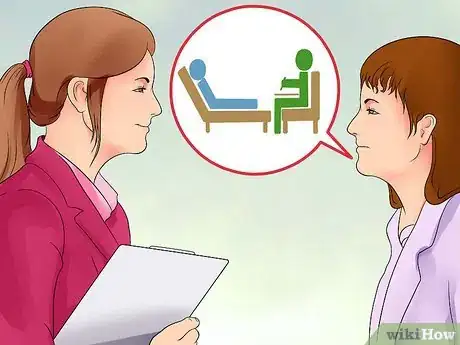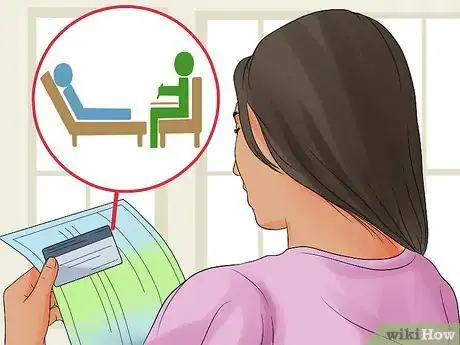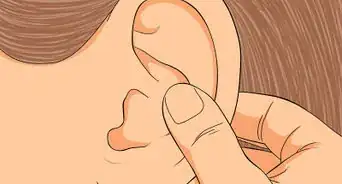This article was co-authored by Padam Bhatia, MD. Dr. Padam Bhatia is a board certified Psychiatrist who runs Elevate Psychiatry, based in Miami, Florida. He specializes in treating patients with a combination of traditional medicine and evidence-based holistic therapies. He also specializes in electroconvulsive therapy (ECT), Transcranial Magnetic Stimulation (TMS), compassionate use, and complementary and alternative medicine (CAM). Dr. Bhatia is a diplomat of the American Board of Psychiatry and Neurology and a Fellow of the American Psychiatric Association (FAPA). He received an MD from Sidney Kimmel Medical College and has served as the chief resident in adult psychiatry at Zucker Hillside Hospital in New York.
There are 15 references cited in this article, which can be found at the bottom of the page.
This article has been viewed 162,793 times.
Do you feel called to become a therapist? Therapists enrich people's lives by helping them them cope with situational distress, depression and anxiety, and mental illness. There are many paths open to people who want to pursue a career in therapy; some people might specialize in an area like marriage and family counseling, others choose to go into social work, and still others hold positions in schools and other institutions. Learn about different types of therapists, educational requirements for becoming one, and how to start a therapy career.
Steps
Understanding the Psychotherapy Field
-
1Know the available opportunities. Therapists share in common the will to help people by providing them with council, but there are many different jobs that fall under this umbrella.[1] Consider the following therapy-related positions:[2]
- Counselors help specific populations in places like schools and churches. A counselor does not need specific training to establish a practice, but most do take specific courses to earn credentials.[3]
- Social workers have master's degrees and are typically employed by agencies to work with individuals or families requiring counseling. Some social workers specialize in counseling children.[4]
- Marriage and Family Therapists (MFTs) often have private practices and provide couples therapy in addition to therapy for individuals and families.[5]
- Psychologists have PhDs and study major approaches to therapy, including cognitive, behavioral, humanistic and psycho dynamic approaches, and work with individuals experiencing depression and other illnesses. Psychologists conduct psychological tests and provide talk therapy to their patients, but in most cases can't prescribe medications or other medical interventions.[6]
- Psychiatrists are actually medical doctors who study psychiatry after finishing medical school.[7] Psychiatrists conduct medical tests, prescribe medications and work with primary physicians and other psychotherapists to devise a course of treatment for their patients.[8]
-
2Talk to therapists. If you're deciding which type of therapy will be the right fit for you, conduct research by talking with therapists who have chosen a variety of different career paths.
- Different types of therapists have different strengths and skill sets. Psychologists, for example, spend time conducting research on different types of therapy. Social workers often enter intense situations and serve as mediators between upset parties. Shadow different therapists to decide what's right for you.
- Ask therapists about the educational paths they took to get to their positions.
Advertisement -
3Begin crafting a plan for a career in therapy. Some degrees take many years to pursue, and it takes extra time to find the right job and build a practice. As soon as you know the general area that interests you, lay out a plan for yourself.[9]
- Get a college degree. No matter what type of therapy you decide to pursue, you'll need to start with a bachelor's degree. Consider majoring in psychology, and study both the sciences and the humanities, since both areas play into the work of a therapist.
- If you know exactly what graduate program you want to pursue, make sure you take all the prerequisite courses.
Educational Requirements for Therapists
-
1Earn a graduate degree.[10] Apply to graduate programs that will prepare you for the career you have chosen. Complete either a master's or PhD program.
- Most programs will include classroom work, research, fieldwork and supervised psychotherapy.
- Keep your career goals in mind as you pursue your degree. Choose classes that will help you learn as much as possible about the type of therapy in which you plan to specialize.
-
2Get clinical experience. The requirements for clinical experience vary according to the degree you obtain, but in most cases two years of experience working as a therapist in a clinic or private practice is mandatory before you can become a licensed.
- The experience must be at a postgraduate level and take place under a licensed therapist's supervision.
- Clinical requirements are much more rigorous for people pursuing psychology and psychiatry.
-
3Get licensed. Most states require that therapists pass a licensing exam in addition to obtaining a master's degree and at least two years of clinical experience.[11]
- Research the exam requirements in your state in order to prepare for the exam and pass it.
- Renew your license every year according to the laws of your state.
Finding a Job as a Therapist
-
1Work for an institution. Look at job listings for candidates with your education level and experience at schools, public health clinics, hospitals, and other places that hire therapists.
-
2Work as part of a group practice. Many therapists share office space in collectives, using their different areas of expertise to serve the needs of a community of clients. Research collectives in your area and contact them to find out if you might join them.
-
3Start your own practice. As you build confidence and form relationships with clients, you may want to start an independent practice. Rent office space in a building or meet with clients in your home.[12]
Expert Q&A
-
QuestionWhat does a child behavioral therapist do?
 Klare Heston, LCSWKlare Heston is a Licensed Independent Clinical Social Worker based in Cleveland, Ohio. With experience in academic counseling and clinical supervision, Klare received her Master of Social Work from the Virginia Commonwealth University in 1983. She also holds a 2-Year Post-Graduate Certificate from the Gestalt Institute of Cleveland, as well as certification in Family Therapy, Supervision, Mediation, and Trauma Recovery and Treatment (EMDR).
Klare Heston, LCSWKlare Heston is a Licensed Independent Clinical Social Worker based in Cleveland, Ohio. With experience in academic counseling and clinical supervision, Klare received her Master of Social Work from the Virginia Commonwealth University in 1983. She also holds a 2-Year Post-Graduate Certificate from the Gestalt Institute of Cleveland, as well as certification in Family Therapy, Supervision, Mediation, and Trauma Recovery and Treatment (EMDR).
Licensed Social Worker They work with the child's identified problem behaviors, like hitting, angry outbursts, etc. They are reality-focused, practical, and work with observable behaviors.
They work with the child's identified problem behaviors, like hitting, angry outbursts, etc. They are reality-focused, practical, and work with observable behaviors.
References
- ↑ https://www.bls.gov/ooh/healthcare/occupational-therapists.htm
- ↑ https://www.huffpost.com/entry/post_9154_b_6865002
- ↑ https://www.learnpsychology.org/counseling/
- ↑ https://www.socialworkguide.org/careers/
- ↑ https://www.aamft.org/About_AAMFT/About_Marriage_and_Family_Therapists.aspx
- ↑ https://www.careerexplorer.com/careers/psychologist/
- ↑ Padam Bhatia, MD. Board Certified Psychiatrist. Expert Interview. 3 April 2020.
- ↑ https://www.psychiatry.org/patients-families/what-is-psychiatry
- ↑ https://positivepsychology.com/how-to-become-a-therapist/
- ↑ Padam Bhatia, MD. Board Certified Psychiatrist. Expert Interview. 3 April 2020.
- ↑ https://www.goodtherapy.org/become-a-therapist/state-licenses.html
- ↑ https://www.apa.org/gradpsych/2011/11/private-practice
- https://www.psychologytoday.com/us/blog/when-kids-call-the-shots/201709/want-be-therapist-5-signs-you-d-be-great-it
- http://www.aboutpsychotherapy.com/Tcredentials.htm
- http://education-portal.com/how_to_become_a_therapist.html
- http://www.psychologyinaction.org/2011/04/09/career-options-for-how-to-become-a-therapist-multiple-pathways-exist/
About This Article
To become a therapist, start by deciding what field of therapy you want to pursue, such as social work, psychiatry, or family counseling. Then, get a bachelor’s degree in psychology or a related field, and a graduate degree in your chosen specialty. You’ll also need to get clinical experience by working in a clinic or private practice for at least 2 years. Afterwards, take the licensing exam required by your state to become a licensed therapist. For more advice, including how to start your own therapy practice, keep reading!






































































